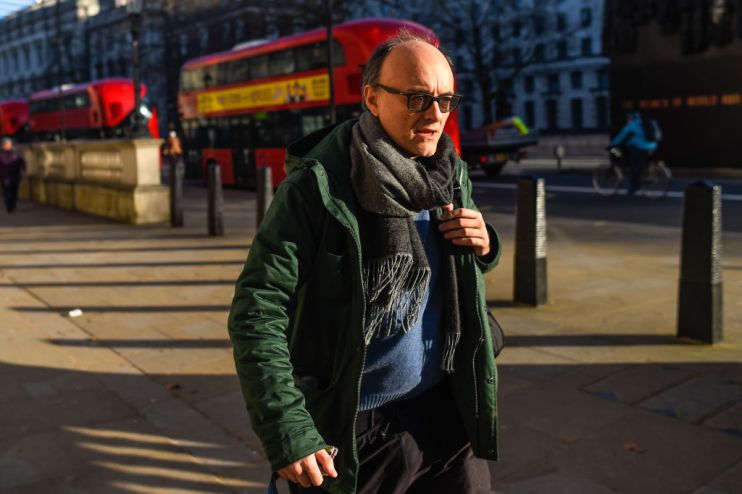Dominic Cummings’ war on conventions is just getting going

Much is being made of Dominic Cummings’ supposed overreach this week.
His attack on the BBC proved so brutal that even Auntie-sceptic John Whittingdale blanched, while one of Number 10’s newly-hired “weirdos and misfits” had voiced his support for marital rape and sympathy for eugenics in online forums. Andrew Sabinsky’s Downing Street career lasted just a few days.
But Boris Johnson’s chief adviser, who is also under fire for creating a toxic environment for staffers, is used to riding out the odd media storm and has no time for subtlety. His slash-and-burn approach is not one of dark arts but of maximum disruption — test a policy idea by floating the most extreme version possible, and cut it back according to what people will put up with.
As former Vote Leave colleagues note, Cummings builds an us-and-them mentality in which his team is pitted against everyone — Remainers, backbenchers, peers, bankers, judges, journalists — in the pursuit of getting whatever it is done.
Ultimately insiders believe an HR misstep, rather than a policy one, may prove Cummings’ downfall. But until he crosses that line, he stays on as the bad cop, while the Prime Minister retains plausible deniability: Johnson didn’t know about Sabisky, he didn’t know about the BBC plans, he didn’t know that journalists were being blocked from briefings, and so on.
Either way Cummings does not give the impression of someone in it for the long-haul. He is in a hurry to tear down all conventions that to his mind stop the executive from exercising full power. The base test for everything is “what is the worst that can happen?” — and so far the answer is “very little”.
One failed gamble was Number 10’s attempted prorogation, but even here there was little in the way of punishment. It just so happens the government is now considering the role of judges and judicial reviews, which suggests a vindictive streak to some of his testing of the limits.
Another area of convention likely to enter the spotlight is parliamentary committees, where Johnson can expect rather less loyalty than his supine cabinet, who were happy to engage in a juvenile game of policy call and response at the most recent meeting.
Sources suggest Number 10 may have had a hand in Damian Collins’ defenestration from the Digital, Culture, Media and Sport Committee last month, encouraging MPs to vote for Julian Knight instead. Of course, Downing Street would have been pushing on an open door — Collins was not popular among the new, pro-Leave intake, as well as many of the existing MPs who’d had enough of his grandstanding.
Downing Street declined to comment. But it would be something of an understatement to say that Collins is also not popular with Cummings, who last year was found in contempt of parliament for not agreeing to give evidence.
At the time Collins warned that this refusal to submit to the authority of parliament revealed a fundamental weakness in the process. “The current powers have been tested to their limits and found wanting,” he said last March.
Cummings’ derision for parliamentary institutions is now expected to extend to the Liaison Committee, a kind of super-committee formed from the heads of all the others, and the only one with the power to call the Prime Minister to explain himself.
Johnson already has form here — just like his chief adviser, he failed to appear last year, having cancelled on former chair Sarah Wollaston not once but twice. The repercussions were slight: an angry letter, a few aggrieved comments, but fundamentally, as worried parliamentary sources tell me, nothing more could be done.
With Johnson’s positively obese majority and Brexit supposedly done, there is now no reason for him to reject the call when it finally comes, or so the (wishful) thinking goes. But that’s not how it is seen within Downing Street.
“Dom’s attitude will be ‘f**k ’em’,” says one former Number 10 source. “The way Dom sees it, you have to grip and totally control the message… [Committee chairs are] showboaters. In that context, I would be pretty surprised if Dom let the PM sit down in front of the committee…
“I know people are starting to see this but having worked with him I don’t think people quite understand the level to which Dom doesn’t give a s**t about convention.”
Much will depend on who replaces Wollaston. There are a handful of names who could present a headache for Number 10 — foreign affairs chair Tom Tugendhat and former business secretary Greg Clark among them, although Jeremy Hunt, who now chairs the health committee, could also be problematic if he choses.
Ultimately, whoever is at the head will only be as powerful as convention allows — and so far Cummings has proved just how weak that can be.